CDC again updates its guidelines on testing people without coronavirus symptoms
From CNN's Jacqueline Howard, Maggie Fox and Jamie Gumbrecht
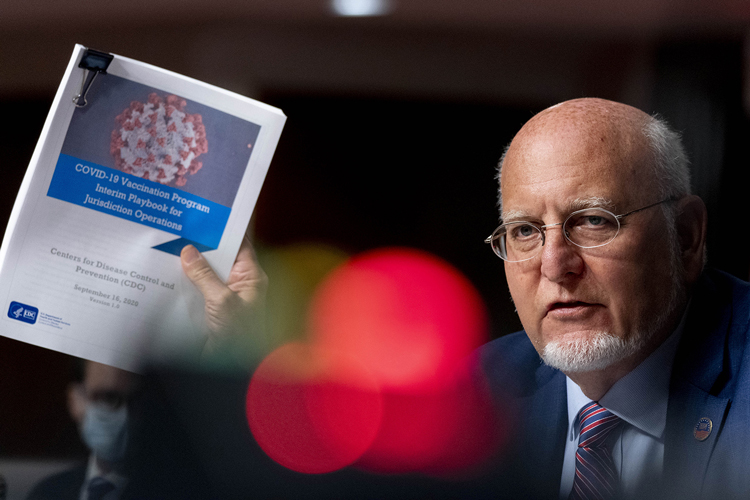 Dr. Robert Redfield holds up a CDC document while he speaks at a hearing of the Senate Appropriations subcommittee reviewing coronavirus response efforts on September 16 in Washington. Andrew Harnik/Pool/Getty Images
Dr. Robert Redfield holds up a CDC document while he speaks at a hearing of the Senate Appropriations subcommittee reviewing coronavirus response efforts on September 16 in Washington. Andrew Harnik/Pool/Getty ImagesThe US Centers for Disease Control and Prevention’s website has updated, yet again, guidelines for testing people who do not have symptoms of coronavirus.
The new language rolls back controversial changes made to the site last month. It once again stresses that anyone who has been in contact with an infected person should be tested for coronavirus.
“Due to the significance of asymptomatic and pre-symptomatic transmission, this guidance further reinforces the need to test asymptomatic persons, including close contacts of a person with documented SARS-CoV-2 infection,” it says.
"Viral tests are recommended to diagnose acute infection of both symptomatic and asymptomatic individuals, to guide contact tracing, treatment options, and isolation requirements," the site now says.
The guidance notes that even if people do not have symptoms, they still need a test if they have been in close contact — such as within 6 feet — of a person with coronavirus infection for at least 15 minutes.
"In areas where there are a small number of new cases and limited spread, your public health department may request a small number of asymptomatic 'healthy people' to be tested," the guidance says. "If there is significant spread of the virus in your community, your public health department may request significant numbers of asymptomatic “healthy people” to be tested in order to help stop the spread of the virus."
On Aug. 24, the CDC site was changed to say: "If you have been in close contact (within 6 feet) of a person with a COVID-19 infection for at least 15 minutes but do not have symptoms, you do not necessarily need a test unless you are a vulnerable individual or your health care provider or State or local public health officials recommend you take one.
The move was heavily criticized by doctors and health agencies.
Two sources told CNN the August change was sent to the CDC by the US Department of Health and Human Services and was supposed to go through a vetting process that includes a director of science, fact-checking, cross-checking and several back-and-forths for scientific review — a process that can take several days. As the document was going through the process, one of the sources told CNN they woke up one morning and saw that the unaltered document had been posted on the CDC's website in its original form and including some errors.
In a statement Thursday night, CDC Director Dr. Robert Redfield told CNN, "The guidelines, coordinated in conjunction with the White House Coronavirus Task Force, received appropriate attention, consultation and input from task force experts."
Trump will talk about vaccines later today. Here's where things stand now.
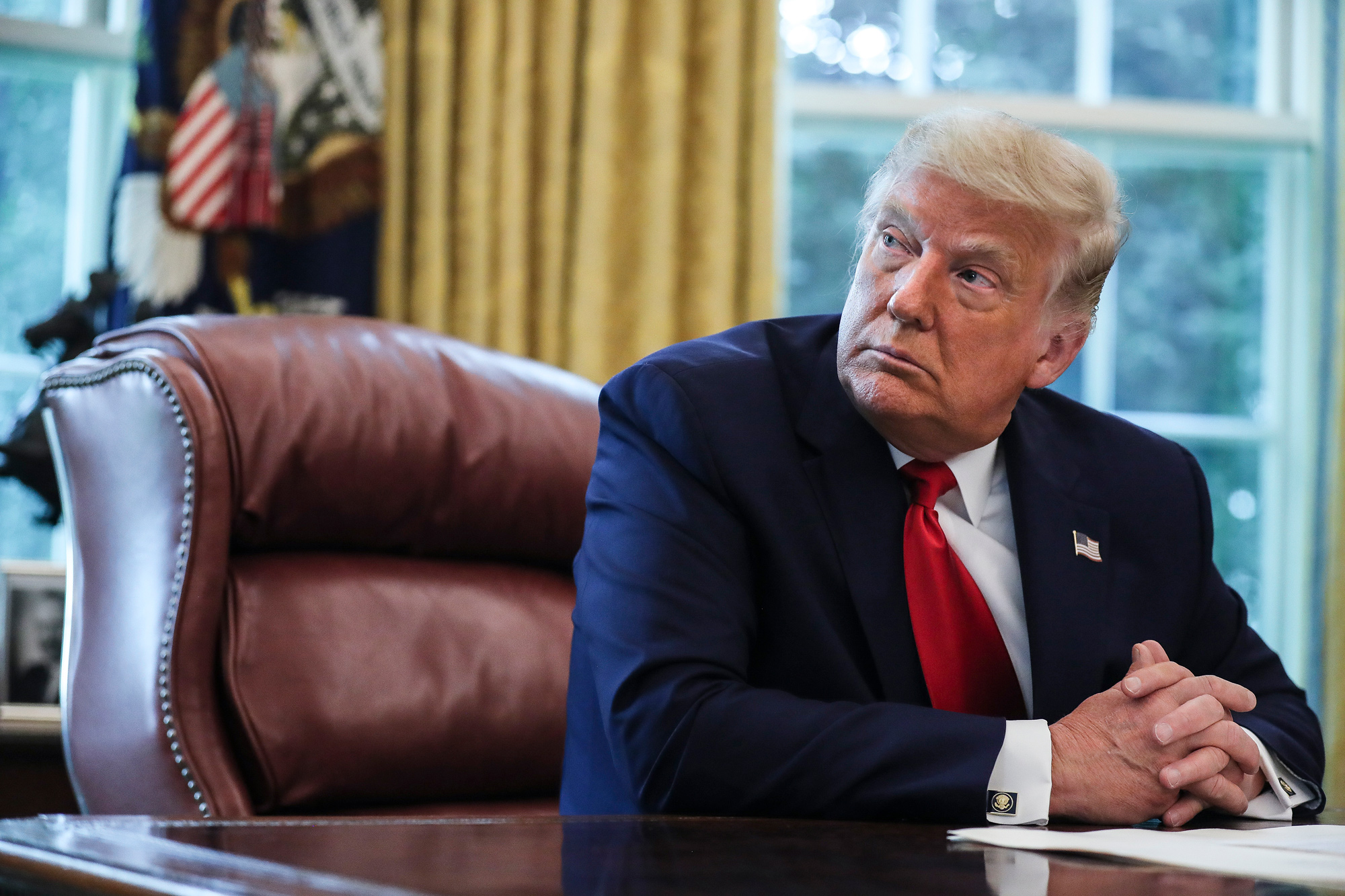 President Donald Trump speaks in the Oval Office on September 17 in Washington, DC. Oliver Contreras/Pool/Getty Images
President Donald Trump speaks in the Oval Office on September 17 in Washington, DC. Oliver Contreras/Pool/Getty ImagesPresident Trump is scheduled to brief reporters at 2 p.m. ET today. White House press secretary Kayleigh McEnany said those in the room will be “hearing a lot about the vaccine” at the briefing.
There's been a lot of news about the race to develop a coronavirus vaccine lately. Here's a look at some of the biggest developments:
US extends travel restrictions with Canada and Mexico through Oct. 21
From CNN's Priscilla Alvarez
Travel restrictions on the United States’ shared borders with Canada and Mexico have been extended through Oct. 21, acting US Customs and Border Protection Commissioner Mark Morgan announced on Twitter Friday.
The announcement marks the latest extension of restrictions on nonessential travel after limits were initially put in place in late March.
Remember: Thousands of people cross the US-Mexico border daily for work, school and other activities. Essential travel includes individuals traveling for medical purposes, attending school or engaged in trade, like truck drivers, among others, according to a regulation notice published in late July.
Politics makes Covid-19 data hard to trust for reopening schools, Florida's Broward county teachers union says
From CNN's Aditi Sangal
As the positivity rates in Florida's Broward County fall between 2 and 4%, the schools face pressure to reopen. But the president of the Broward Teachers Union says they are not able to trust that the numbers are accurate because of the politics involved in the situation.
Broward County School Superintendent Robert Runcie is recommending Broward schools reopen for in-person learning on Oct. 5, according to a tweet from the superintendent's verified account.
Other than the numbers, the threat to hold back funding if schools don't reopen for in-person classes also looms large, Fusco says. But to return to school, she says hiring more staff, sanitization plans and facilities as well as ample personal protective equipment and hygiene products are basic requirements.
“We have 206 schools. We have some schools that have been around over 40 years, so things like that that need to be put in place, [like] air quality and sanitizing and cleanliness and just enough staff to be out there and about and taking care of that intermittent cleaning. It shouldn't be put on the teachers to take care of that. It all boils down to finding.”
“If it wasn't, you know, for the politics, we'd have the funding.”
Some background: Dr. Anthony Fauci, the director of the National Institute of Allergy and Infectious Diseases, described in August how communities could approach reopening schools for in-person learning, saying that schools in communities with less than a 5% positivity rate — designated as a green zone — can explore allowing for schools to reopen but with with adequate precautions. These measures include wearing masks, opening windows and having susceptible children work remotely.
Watch the interview:
Testing guidance outside normal review process undermines medical community, doctor says
From CNN's Aditi Sangal
A recent CDC testing guidance was published outside normal review process, according to a report published Thursday by The New York Times, and the document was sent to the CDC by the US Department of Health and Human Services, a source told CNN.
Dr. Syra Madad, senior director of special pathogens program at NYC Health + Hospitals said the new report "means that the political interference is ongoing,” adding that science is “taking a back seat and that political interference is what we're dealing with.”
"That recommendation is absolutely not based on science. It's not based on epidemiology," she added.
Madad emphasized the importance of trusting health agencies at this point during the pandemic to maintain public trust. Issuing testing guidance outside normal review process undermines the medical community, she adds.
Health expert: "This virus is controllable" in the US
From CNN's Mallory Simon
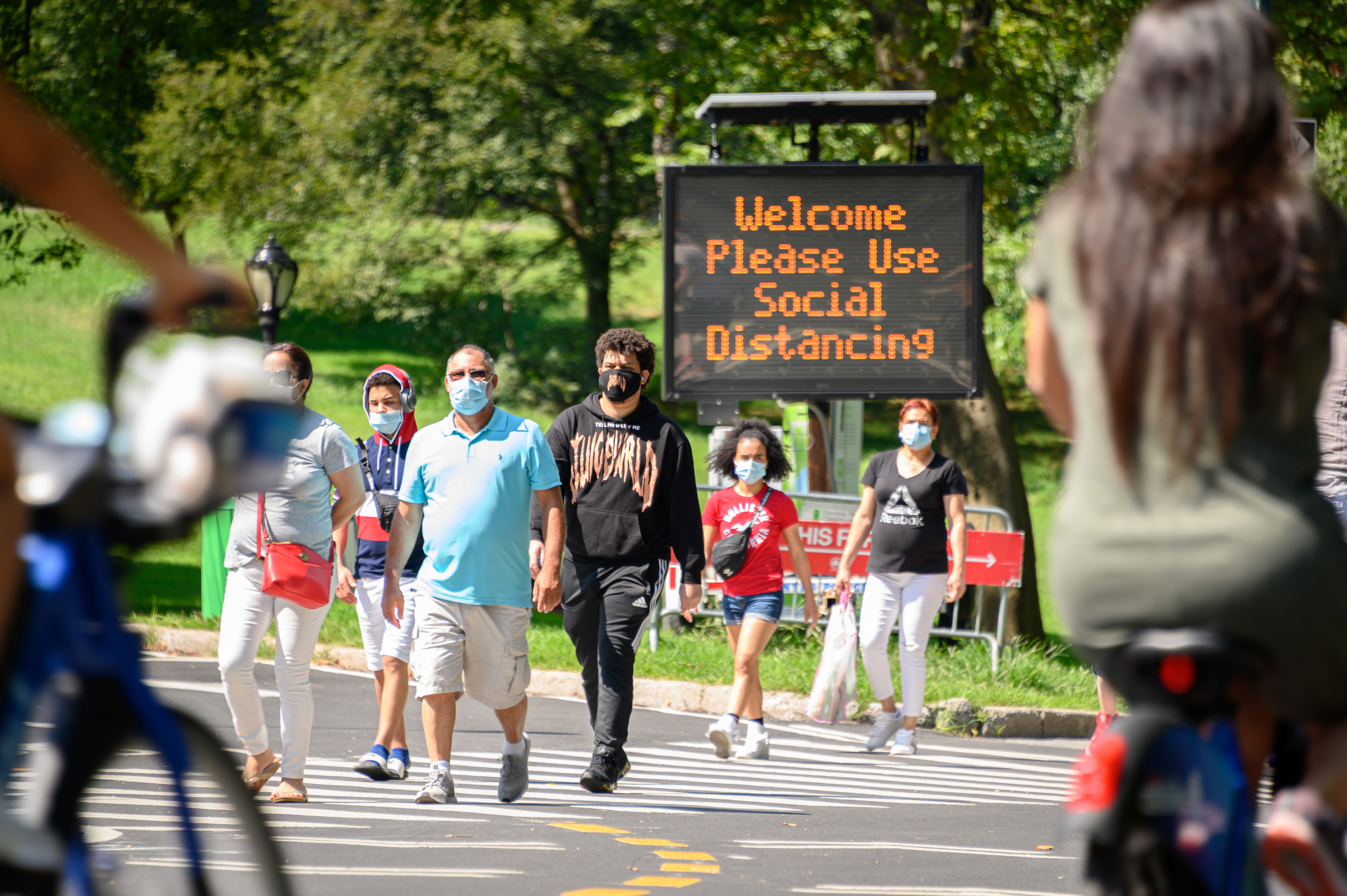 People visit Central Park in New York on September 6. Noam Galai/Getty Images
People visit Central Park in New York on September 6. Noam Galai/Getty ImagesCoronavirus in the United States can be “overturned," Maria Van Kerkhove, technical lead for the World Health Organization's coronavirus response, told CNN’s Dr. Sanjay Gupta on Friday.
Her comments come as the US approaches the grim milestone of 200,000 coronavirus deaths. Meanwhile, Johns Hopkins University data shows an uptick in new cases compared to the previous week in a majority of US states.
Van Kerkhove said she knows there is frustration about how long it takes to defeat the virus, and that some places aren’t seeing case numbers go down – but that it is important to keep perspective that it can change.
“I've had people call me and say, could you please stop saying” the virus can be defeated, since it’s not under control where live, Van Kerkhove said.
“And what I say to them is, we have seen it over and over and over again, demonstrated over and over and over again, that it can be,” Van Kerkhove said. “And so that's why we keep encouraging people to do so and laying out the tools – not just saying you can do it, but laying out the tools. And in the United States, this can be overturned … you can overcome this and you will. And I know you will.”
Listen to Maria Van Kerkhove:
The US is approaching 200,000 Covid-19 deaths. Here's a look at where cases are rising across the country.
From CNN's Amanda Watts and Joe Youorski
As the United States approaches the grim milestone of 200,000 coronavirus deaths, Johns Hopkins University data shows an uptick in new cases compared to the previous week in a majority of US states.
Here's a look at those latest trends on the US map:
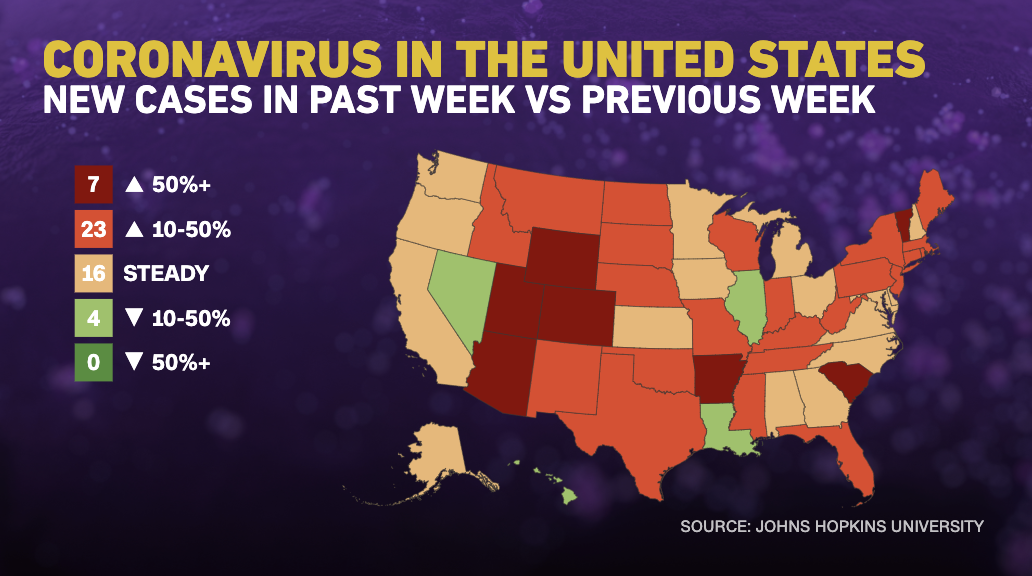
The US added at least 44,360 new Covid-19 cases and 870 reported deaths on Thursday, according to Johns Hopkins University.
The nation has a seven-day average of new daily cases of 39,759. This number has been creeping up over the last few days, now to 13% more than the previous week.
The US continues to lead the world in total coronavirus cases. There have been at least 6.6 million cases in the country since the first case was reported in January.
Track Covid-19 cases in your state here.
Rising Covid-19 hospitalizations could overburden health systems as countries enter flu season, WHO says
From CNN's Naomi Thomas
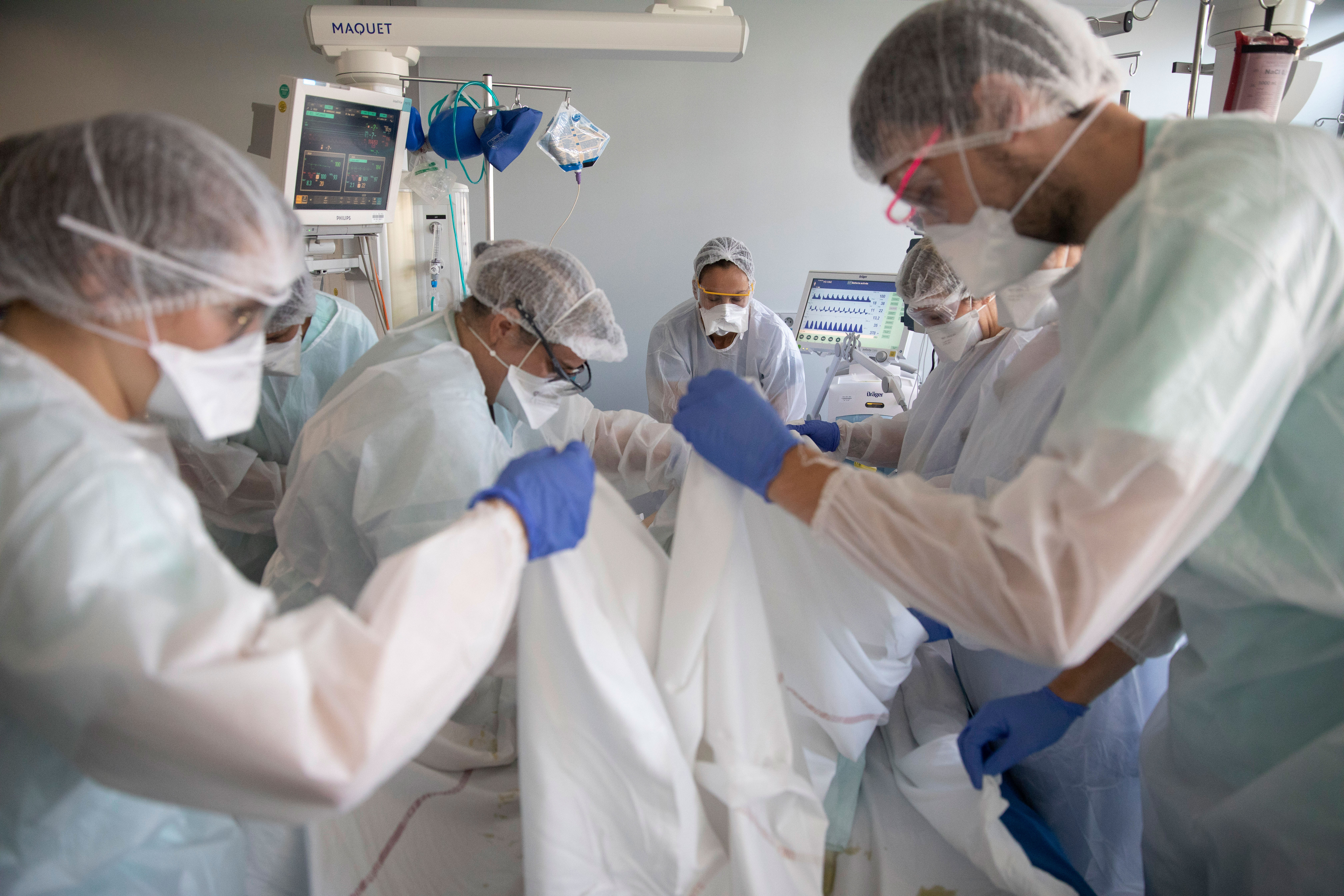 Medical workers tend to a Covid-19 patient at a hospital in Strasbourg, France, on September 15. Jean-Francois Badias/AP
Medical workers tend to a Covid-19 patient at a hospital in Strasbourg, France, on September 15. Jean-Francois Badias/APThe worrying Covid-19 trends in Europe includes an increase in hospitalizations and people who are needing intensive care treatment, according to Maria Van Kerkhove, WHO’s technical lead for coronavirus.
The UK has doubled hospitalizations every eight days or so, Van Kerkhove said on CNN’s New Day on Friday, and there are parts of France that are reaching ICU capacity.
Given that the northern hemisphere hasn’t yet really hit autumn or winter or even started to hit the flu season, “we’re worried that these increasing numbers of hospitalizations and ICU are really going to overburden an already burdened system,” Van Kerkhove said.
Flu vaccines will be key this year, she said.
“So we really need to see flu vaccination uptake increased across the northern hemisphere this year, especially this year,” she said. “Because we have a tool against flu, we don’t yet have that for Covid, but we have it for flu. And that will help, and it will particularly help vulnerable populations.”
Weekly Covid-19 cases in Europe are spiking. Here's the latest on the pandemic from the continent.
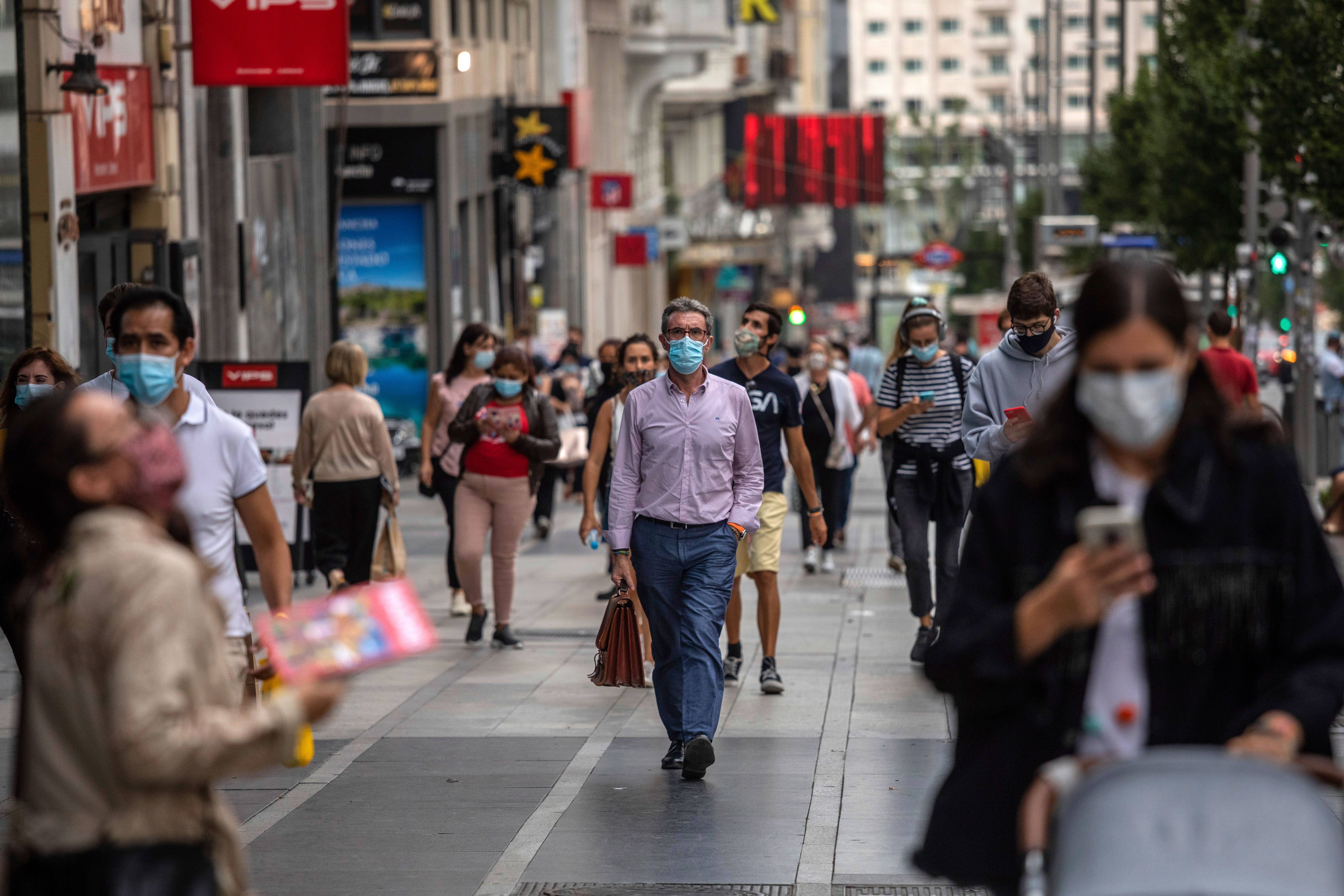 People walk in downtown Madrid on September 17. Bernat Armangue/AP
People walk in downtown Madrid on September 17. Bernat Armangue/APThe World Health Organization yesterday warned that coronavirus cases are surging alarmingly in Europe, as a "very serious situation" unfolds across the continent.
Weekly cases are now more than those reported at the peak of the pandemic in Europe, WHO said.
With cases spiking around Europe, some areas are implementing new restrictions to fight the pandemic. Here's what you need to know about this morning about in coronavirus in Europe:

 5 years ago
871
5 years ago
871 

